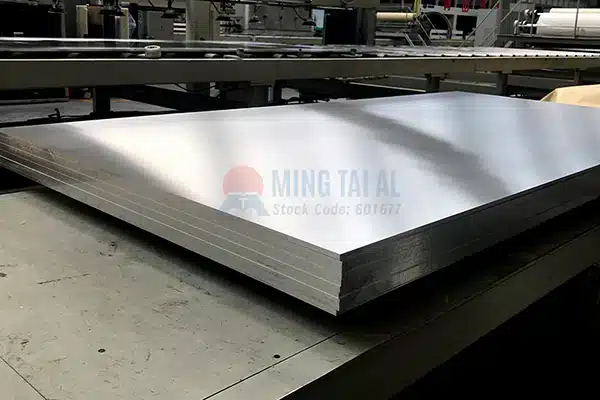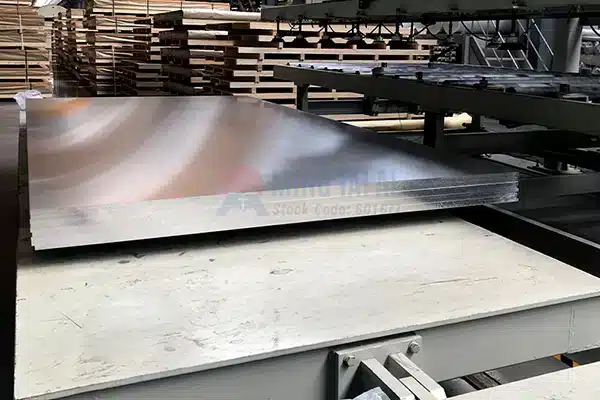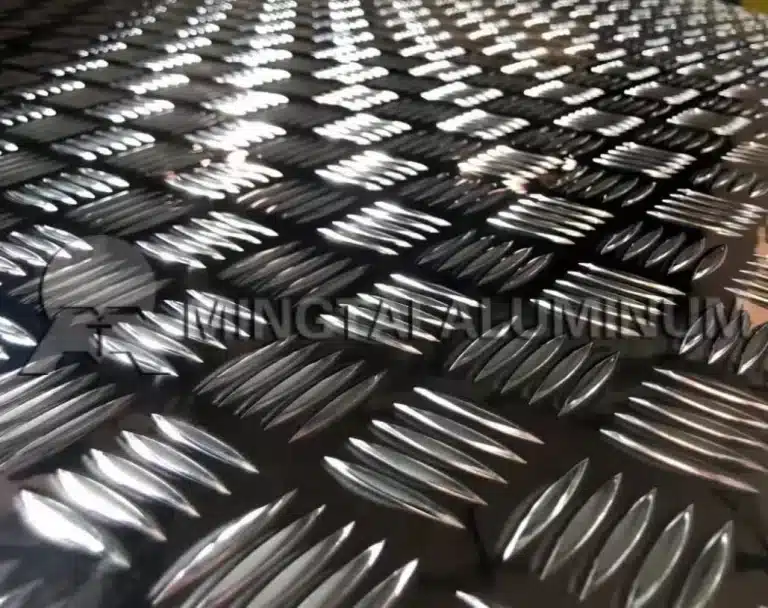
Understanding Aluminum Sheet Grades: Why They Matter
What Are Aluminum Sheet Grades?
Aluminum sheet grades come down to their alloy blend and how they’re treated. They’re split into groups. Each group has its own vibe based on the metals mixed in. Like, the 1000 series is pretty much just aluminum. It’s awesome at fighting rust but not super strong. Other groups toss in things like magnesium, silicon, or zinc. Those pump up stuff like strength, sturdiness, or how easy it is to work with the metal. The temper—think O, H12, or T651—shows what kind of heat treatment or hardening the sheet got to hit the right qualities.
The size of aluminum sheets also plays a part in their grades. Take the 5251 aluminum sheet. You can get it in thicknesses from 0.1mm to 500mm. Widths go from 100mm to 2650mm. Those measurements make it perfect for jobs that need exact sizes.
How Aluminum Sheet Grades Shape Industrial Uses
Choosing the right aluminum sheet grade totally changes how it works for industrial stuff. For example, 5059 aluminum sheets are crazy strong and don’t rust easily. They’re used all the time in LNG storage tanks, gas cylinders, ships, and tank trucks. But 3003-H14 aluminum sheets? They’re champs at welding and bending. That’s why they’re great for fuel tanks and trailer siding.
Every grade’s got its own thing going on. That decides how it holds up in different spots. High-strength ones like 6061-T651 are awesome for building big structures. They don’t crack under pressure and are super easy to shape. Meanwhile, lightweight, rust-proof grades are a must for aerospace or marine jobs. Keeping things light and tough against harsh conditions is a big deal there.
Common Aluminum Sheet Grades and Their Uses
1000–5000 Series: Lightweight and Rust-Proof Grades
The 1000–5000 series aluminum sheets are light as a feather and amazing at dodging rust.
1000 Series: This bunch is almost pure aluminum—99% or more. It’s great at handling chemical damage but not the strongest.
3003 Aluminum Sheets: The 3003 is a classic aluminum-manganese mix. It fights rust well. Its smooth look and bendy nature make it a favorite for fuel tanks and food handling gear.
5052 Aluminum Sheets: The 5052 is an aluminum-magnesium combo. It’s one of the top rust-fighting aluminum sheets. You’ll see it a lot in ocean settings since it laughs off saltwater rust.
5252 Aluminum Sheets: The 5252 grade pops for its cool color after oxidation. It’s tough against wear and lasts forever. It’s used a bunch for phone cases or air conditioner covers.
5251 Aluminum Sheets: This one’s a go-to for structural parts in trains and aerospace gear. It’s got a nice balance of strength and rust resistance.
6000–7000 Series: High-Strength and Special Grades
The 6000–7000 series is all about high-strength alloys. They’re built for tough industrial jobs where handling stress is everything.
6061 Aluminum Sheets: The 6061-T651 grade mixes extra strength, rust resistance, and easy shaping. It’s used a ton in structural frames, base plates, motorcycle parts, and car bits. Being able to heat-treat it is a big plus.
6082 Aluminum Sheets: These sheets are great for structures carrying heavy stuff. They’ve got awesome qualities and still hold up against rust pretty well.
7075 Aluminum Sheets: This is one of the toughest aluminum alloys out there. Zinc’s the main extra ingredient. It’s a star in aerospace because the weight-to-strength balance is so key.
By figuring out what makes these grades different—whether it’s their chemical mix or physical qualities—folks in industries can grab the perfect material for their projects. Whether you’re all about keeping things light or need stuff that can handle extreme conditions, there’s an aluminum sheet grade that’s just right.
Choosing the Right Aluminum Sheet Grade for Your Project
Key Things to Think About: Environment, Weight, and Shaping
Picking the best aluminum sheet grade for your project means digging into a few big things. The environment where it’ll be used is huge. For instance, 5052 aluminum sheets are champs at fighting marine rust. They’re awesome for coastal or ocean jobs. Same deal with 5059 aluminum sheets. They’re used in LNG storage tanks, gas cylinders, and ships since they’re strong and rust-proof.
How much weight the sheet can handle matters a lot too. High-strength grades like 6061-T651 are super tough. They don’t crack under stress. That makes them great for structural stuff like base plates or car parts. If you need something light and easy to bend, 3003-H14 sheets are probably your best bet.
How you’ll shape the material is another thing to think about. For example, 5252 aluminum sheets are really bendy. They’re a breeze to form into tricky shapes. But 6061 aluminum sheets? They’re heat-treatable and easy to machine, but not as flexible. Keeping these things in mind makes sure the material fits the job and the making process.
Cost vs. Performance: Balancing Your Budget and Needs
Balancing cost and performance can be a pain when picking an aluminum sheet grade. Fancy alloys like 7075 aluminum sheets have killer strength-to-weight ratios. But they’ll cost you more because of their special mix and processing. Cheaper picks like 3003 aluminum sheets are great for welding and rust resistance. They’re solid for less heavy-duty jobs.
Custom sizes can bump up the price too. Things like thickness, width, and length make a difference. For example, the 5251 aluminum sheet comes in thicknesses from 0.1mm to 500mm. Widths go from 100mm to 2650mm. That kind of flexibility is cool but can cost more depending on what you need.
You’ve gotta think about the long haul when looking at costs. Going for rust-proof grades like 5052 or 5252 means they’ll last longer. That can save you cash on upkeep later. Chatting with manufacturers or suppliers can help sort out pricing. Like, sales folks can give you solid quotes for 5059 aluminum sheets based on what you’re doing.
MINGTAI ALUMINUM’s Sheet Metal Grades and Global Standards

MINGTAI ALUMINUM Passed Global Standards
MINGTAI ALUMINUM’s got a huge lineup of sheet metal grades. They’re made to fit all sorts of industrial needs. We stick to global standards like ASTM-B209. That means our stuff is always top-notch for different jobs.
One of their best is the 3003-H14 aluminum sheet. It’s awesome for welding and fights rust like a pro. It’s super popular for fuel tanks, food handling gear, and trailer siding. Its smooth look and wallet-friendly price are big wins.
For projects needing more muscle and easy shaping, MINGTAI ALUMINUM’s got 6061-T651 aluminum sheets. These are used in structural frames, motorcycle parts, and car components. They don’t crack under stress and are a breeze to machine.
In marine or heavy-duty industrial spots, MINGTAI ALUMINUM offers 5059 aluminum sheets. These are made for LNG storage tanks, gas cylinders, ships, and tank trucks. Their killer rust resistance makes them super reliable in rough conditions.
MINGTAI ALUMINUM’s also got cool stuff like the 5252 aluminum sheet. It’s known for being tough against wear and lasting ages after oxidation treatment. This medium-high strength alloy is a favorite for electronics casings, like phone or air conditioner covers.
Sticking to global standards makes MINGTAI ALUMINUM a trusted name. Products like the 6061-T651 sheet hit ASTM B209 specs. That means we work with engineering needs all over the world.
With a big range of grades—from lightweight 3003 series alloys to beefy 7075 series alloys—MINGTAI ALUMINUM’s got something for everyone, from aerospace to construction. We keep quality tight every step of the way.
FAQ
Q: What exactly are aluminum sheet grades?
A: Aluminum sheet grades are types of aluminum sheets defined by their alloy mix and how they’re processed (like tempering). Each grade has its own strengths, like rust resistance or toughness, based on what metals—like magnesium or zinc—are blended in. They’re grouped into series, such as the 1000 or 6000 series, to show their unique traits.
Q: Why do aluminum sheet grades matter for projects?
A: The grade you pick decides how the sheet will perform. Need something lightweight and rust-proof for a boat? Go for a 5052 grade. Building a sturdy frame? A 6061-T651 grade is your friend. Choosing the wrong grade could mean the material fails under stress or rusts too fast.



